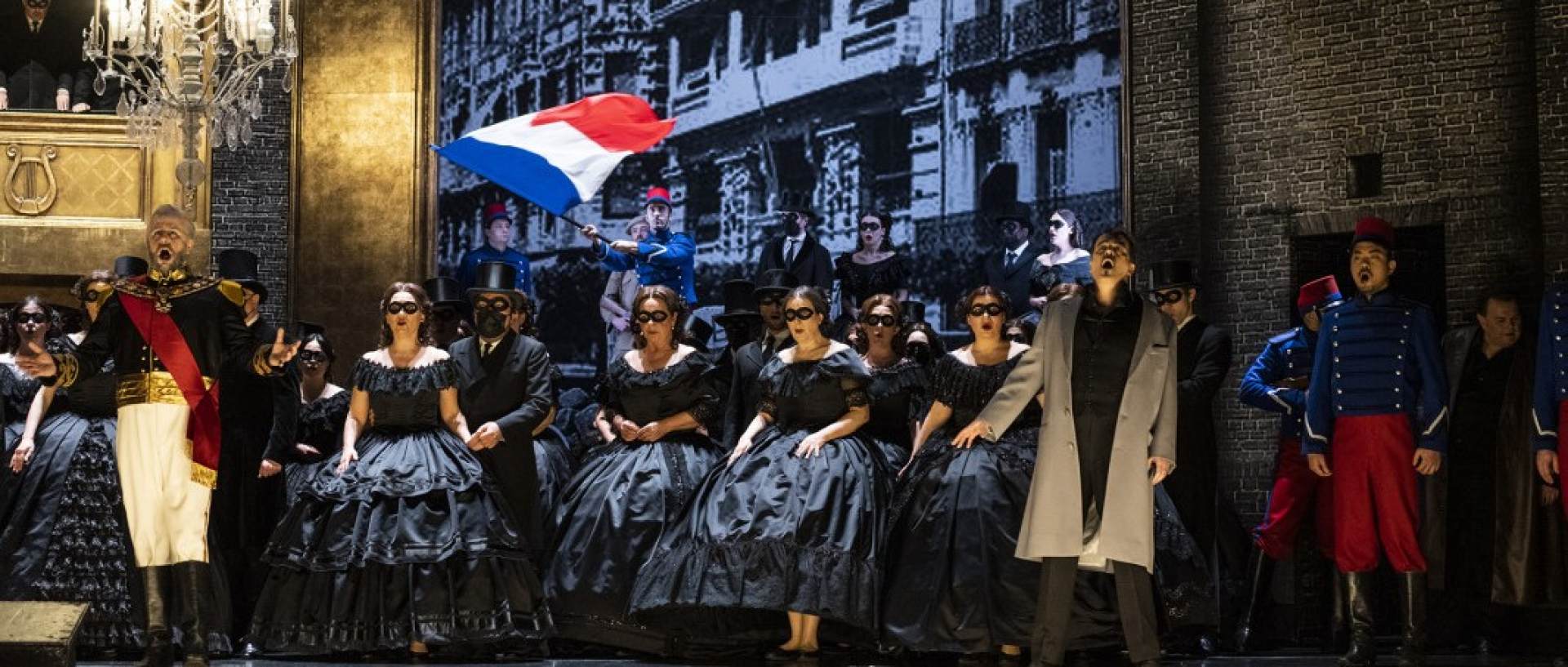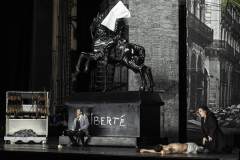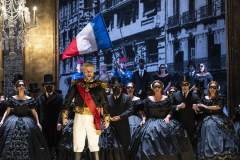The Sicilian Vespers
May 2025 | ||||||
|---|---|---|---|---|---|---|
Mo | Tu | We | Th | Fr | Sa | Su |
Giuseppe Verdi in May
The Sicilian Vespers - Giuseppe Verdi (1813 – 1901)
Opera in five acts
Libretto by Eugène Scribe and Charles Duveyrier
First performed on 13 June 1855 at the Théâtre Impérial de L'Opéra Paris as part of the Paris World's Fair
Premiere at the Deutsche Oper Berlin on 20 March 2022
Recommended for ages 16 and up.
Duration: 3 hrs 45 mins / 1 interval
In French language with German and English surtitles
Pre-performance lecture (in German): 45 minutes prior to each performance
Synopsis
Place: Palermo, Italy
Time: 1282
Prior to the events of the opera, Procida, a leading Sicilian patriot, was wounded by French troops during their invasion of Sicily, and was forced into exile. Montfort, leader of the French troops, raped a Sicilian woman who later gave birth to a son, Henri. Montfort became governor of Sicily, while the Sicilian woman brought up her son to hate him, without revealing to Henri that Montfort was his father.
Act 1
Palermo's main square
Thibault, Robert and other French soldiers have gathered in front of the Governor's palace. As they offer a toast to their homeland, they are observed by the local Sicilians, unhappy with the occupation.
Hélène, who is being held hostage by the French governor, Montfort, enters dressed in mourning for her brother, Duke Frédéric of Austria, who had been executed by the French exactly a year before and whose death remains unavenged. Somewhat drunk, Robert, a French soldier of low rank, demands that she sing and she agrees. Her song about the prayers of seamen (Ô viens à nous, Dieu tutélaire! – "Pray, O mighty God, calm with thy smile both sky and sea") and God's reply of "let dangers be scorned" ends with a rallying-cry (Courage!… du courage!) to the Sicilians to rebel against the occupiers. When the governor enters, the crowd calms down. Henri, just released from prison, assures Hélène how deeply he despises the governor. Overhearing this, Montfort orders Hélène to leave and then, alone with Henri, offers him a powerful position with his men as long as he stays away from Hélène. He refuses, and immediately follows Hélène into the palace.
Act 2
Beside the sea
Procida lands on the shore from a small fishing boat. It is clear that he is returning from exile and he expresses his joy at returning to his native land and city (Et toi, Palerme – "O thou Palermo, adored land"). He is surrounded by Mainfroid and other companions and he quickly orders his men to bring Hélène and Henri to him (Dans l'ombre et le silence – "In darkness and in silence"). The three make plans for an uprising during the impending festivities leading to the marriages of a group of young people. After Procida leaves, Hélène asks Henri what reward he seeks. Swearing that he will avenge her brother's death, he asks for nothing but her love.
Béthune arrives with an invitation from Montfort to attend a ball. Henri refuses and is arrested and dragged off. Led by Robert, a group of French soldiers arrive and Procida returns and sees that it is too late to save Henri, since the young people have come into the square and have begun to dance. As the dance becomes more lively, Robert signals to his men, who seize many of the young women, dragging them off in spite of the protests of the young Sicilian men. The dejected young men witness a passing boat filled with French nobles and Sicilian women, all bound for the ball. Procida and others determine to gain entrance to the ball and seek their revenge.
Act 3
Scene 1: Montfort's palace
Montfort reads a paper from the woman whom he abducted, which reveals that Henri is his son (Oui, je fus bien coupable et coupable par elle! – "Yes, I was guilty, and she blamed me!"). Béthune tells him that Henri has been brought by force, but Montfort exalts in the fact that his son is close by (Au sein de la puissance – "Amid the power, amid the grandeur, an immense, terrible void"). The two men confront one another and Henri is somewhat puzzled by the way he is being treated. Finally, Montfort reveals the letter written by Henri's mother. Taken aback but still defiant, Henri insults his father who reacts in anger as the younger man rushes out: "Fatal word!, Mortal insult! The joy has vanished ...".
Scene 2: A ball at Montfort's palace
When Montfort enters, he gives the signal for the ballet to begin.[24] In the crowd, but disguised, are Hélène, Henri, and Procida. Henri is surprised when the two reveal themselves and they declare that their purpose is to save the young man. However, he is disturbed to hear that they intend to kill Montfort and when the father approaches the son, there is a hint of warning given. As approaching assassins close in, Henri leaps in front of his father just as Hélène approaches. The Sicilians are horrified to see that Henri is being spared as the ensemble contemplates the situation. Hélène, Procida, Daniéli and the Sicilians curse Henri as they are dragged away, while he wants to follow, but is restrained by Montfort.
Act 4
A prison
Henri arrives at the prison gate and, on Montfort's orders, waits to be admitted. He contemplates the situation that his friends are in (O jour de peine – Day of weeping, of fierce sorrow!"). Hélène is brought out and confronts him. Finally, he admits that Montfort is his father and she begins to be willing to sympathise (Ami! le cœur d'Hélène... – "Henri! Ah, you speak to a heart already prepared to forgive") Not seeing Henri, Procida approaches Hélène and reveals a letter telling him of awaiting freedom. But Montfort arrives and orders a priest and the execution of the prisoners while Procida is amazed to discover the truth of Henri's situation. Henri begs for mercy for his friends and Montfort confronts him with one thing: Dis: mon père! dis – "Say to me only, say "My father ...". Henri says nothing as the executioner appears and the couple are led away, followed by Henri. Montfort steps in to prevent him from joining them. As Hélène is led towards the executioner, Montfort steps in and announces a pardon for the Sicilians. Furthermore, he agrees to the marriage of Hélène and Henri and announces to the crowd: "I find a son again!" There is general rejoicing.
Act 5
The gardens of Montfort's palace
As knights and maidens gather, Hélène gives thanks to all (Merci, jeunes amies – "Thank you, beloved friends"). Henri arrives, exclaiming his joy (La brise souffle au loin – "The breeze hovers about"). He leaves to find his father, but Procida arrives, announcing a plan to outwit his enemies with their massacre to take place at the foot of the altar after the vows have been said. She is torn, the more so following Henri's return, between her love and her duty (Sort fatal! – "Fatal destiny! Oh, fierce conflict!"). Finally, she can go no further and she tells Henri that they cannot be married. Both men are furious with her for her seeming betrayal. Then Montfort arrives, takes the couple's hands, joins them together, and pronounces them married as the bells begin to ring. This is the signal for the Sicilians to rush in and hurl themselves upon Montfort and the French.
Program and cast
Conductor: Dominic Limburg
Stage Director: Olivier Py
Set Design; Costume Design: Pierre-André Weitz
Light Design: Bertrand Killy
Chorus Director: Jeremy Bines
Dramaturge: Jörg Königsdorf
Hélène: Hulkar Sabirova
Ninetta: Arianna Manganello
Henri: Valentyn Dytiuk
Guy de Montfort: George Petean
Jean de Procida: Roberto Tagliavini
Thibault: Chance Jonas-O'Toole
Danieli: Gideon Poppe
Mainfroid: Jörg Schörner
Robert: Joel Allison
Le Sire de Béthune: Gerard Farreras
Le Comte de Vaudemont: Jared Werlein
Orchestra: Orchester der Deutschen Oper Berlin
Chöre: Chor der Deutschen Oper Berlin
Dancer: Opernballett der Deutschen Oper Berlin
Deutsche Oper Berlin
The Deutsche Oper Berlin is an opera company located in the Charlottenburg district of Berlin, Germany. The resident building is the country's second largest opera house and also home to the Berlin State Ballet.
The company's history goes back to the Deutsches Opernhaus built by the then independent city of Charlottenburg—the "richest town of Prussia"—according to plans designed by Heinrich Seeling from 1911. It opened on November 7, 1912 with a performance of Beethoven's Fidelio, conducted by Ignatz Waghalter. After the incorporation of Charlottenburg by the 1920 Greater Berlin Act, the name of the resident building was changed to Städtische Oper (Municipal Opera) in 1925.
Deutsches Opernhaus, 1912
With the Nazi Machtergreifung in 1933, the opera was under control of the Reich Ministry of Public Enlightenment and Propaganda. Minister Joseph Goebbels had the name changed back to Deutsches Opernhaus, competing with the Berlin State Opera in Mitte controlled by his rival, the Prussian minister-president Hermann Göring. In 1935, the building was remodeled by Paul Baumgarten and the seating reduced from 2300 to 2098. Carl Ebert, the pre-World War II general manager, chose to emigrate from Germany rather than endorse the Nazi view of music, and went on to co-found the Glyndebourne opera festival in England. He was replaced by Max von Schillings, who acceded to enact works of "unalloyed German character". Several artists, like the conductor Fritz Stiedry or the singer Alexander Kipnis followed Ebert into emigration. The opera house was destroyed by a RAF air raid on 23 November 1943. Performances continued at the Admiralspalast in Mitte until 1945. Ebert returned as general manager after the war.
After the war, the company in what was now West Berlin used the nearby building of the Theater des Westens until the opera house was rebuilt. The sober design by Fritz Bornemann was completed on 24 September 1961. The opening production was Mozart's Don Giovanni. The new building opened with the current name.

 EN
EN DE
DE IT
IT FR
FR ES
ES RU
RU JP
JP RO
RO
 Seating plan
Seating plan 





